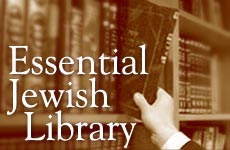 Iran’s Attack on Israel
Iran’s Attack on Israel


3 min read
Ten books that are essential to any Jewish home.
Certain books are an essential part of any Jewish home: a siddur (prayer book), a Chumash (Five Books of Moses) and books of philosophy. These are the foundations for a Jewish life which pulsates with the rhythms of Torah study and practice.
Here's my list of top-10 favorites. See here for a more extensive reading list.
1) STONE CHUMASH (order from ArtScroll)
Rabbi Nosson Scherman (ArtScroll-Mesorah 1993)
Modern translation of the Five Books of Moses. Features a thorough, user-friendly commentary, culled from Talmudic, medieval and contemporary sources.
2) ARTSCROLL SIDDUR (order from ArtScroll)
Mesorah Publications 1984
More than just a text of the prayers, it includes full explanations of all the prayers, laws and customs. Features a masterful essay on the essence of prayer. Includes special prayers for the holidays and lifecycle events. Beautifully organized and designed. A must for every Jewish home.
3) THE BOOK OF OUR HERITAGE (order from Amazon)
Rabbi Eliyahu Kitov (Feldheim 1978)
A thorough review of the Jewish calendar. Includes month-by-month explanation of all the holidays, laws and customs throughout the Jewish year. A classic.
4) TO BE A JEWISH WOMAN (Order from Amazon)
Lisa Aiken (Jason Aronson 1992)
The long-awaited compendium for the modern Jewish woman. Includes issues of the synagogue, child-raising, modesty, the mikveh, and spirituality. Plus a historical overview of the Matriarchs.
5) HEAVEN ON EARTH (order from Amazon) Edited by Nechemia Coopersmith and Shraga Simmons (Aish.com 2002)
An anthology of essays from Aish.com, showing how to bring spirituality into everyday life. Captivating true stories take you from a hospital in Ethiopia to the nightclubs of Moscow; from an ashram in India to a cancer ward in London; from Ground Zero in Manhattan to the Golden Gate Bridge, and to Jerusalem, standing before to the Western Wall. Great gift for beginners and veterans alike.
6) TRIUMPH OF SURVIVAL (order from ArtScroll)
Rabbi Berel Wein (Shaar Press 1990)
The complete story of the Jews in the modern era, from 1650-1990. Filled with facts and anecdotes. Includes: Enlightenment, anti-Semitism, American Jewry, the Holocaust, and the State of Israel. Drawn from Rabbi Wein's masterful lecture series.
7) THE ARYEH KAPLAN ANTHOLOGY (order from ArtScroll)
Rabbi Aryeh Kaplan (NCSY-Mesorah 1988)
Listed in "Who's Who" as an accomplished physicist, Aryeh Kaplan applied his brilliant mind first and foremost to Torah study -- mastering all the works of Jewish philosophy, law and kabbalah. He shared his encyclopedic knowledge in a series of masterful essays that blend the mystical and the practical. Topics include: God, Jerusalem, Shabbat, Soul & Afterlife.
8) THE SCIENCE OF GOD (order from Amazon)
Gerald Schroeder (Bantam 1990)
A groundbreaking work that confronts head-on the cosmological debate, explaining how Torah and science do not conflict. The author, a former M.I.T. professor of nuclear physics and member of the U.S. Atomic Energy Commission, is now a lecturer at Aish Jerusalem.
9) GATEWAY TO HAPPINESS
Rabbi Zelig Pliskin (Aish HaTorah 1980)
Attitude controls mood. Learn the Torah's techniques for ridding anxiety, fear and stress -- while increasing joy, appreciation and energy. A noted psychologist and Talmudic scholar, Rabbi Pliskin teaches at Aish Jerusalem.
10) ON JUDAISM (order from ArtScroll)
Rabbi Emanuel Feldman (Shaar Press 1994)
In the form of conversations between a rabbi and a seeker, this book delightfully weaves the fabric of Jewish life including faith, ethics, study, community and more. The author, a law school professor and magazine editor, is the rabbi who built Torah Judaism in Atlanta from the ground up.
